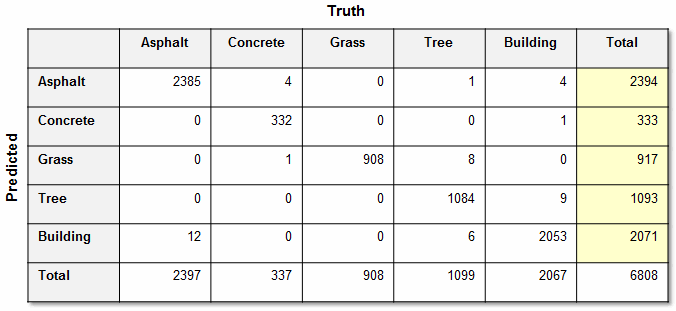The RowTotals function method returns the totals of each row in the confusion matrix.
The row totals correspond to the number of predicted values in each class. In the example confusion matrix, the row totals are computed as follows:
Asphalt: 2385 + 4 + 0 + 1 + 4 = 2394
Concrete: 0 + 332 + 0 + 0 + 1 = 333
Grass: 0 + 1 + 908 + 8 + 0 = 917
Tree: 0 + 0 + 0 + 1084 + 9 = 1093
Building: 12 + 0 + 0 + 6 + 2053 = 2071

Example
The code example below evaluates classifications using a confusion matrix.
PRO EvaluateClassificationUsingConfusionMatrix
COMPILE_OPT IDL2
e = ENVI()
File = Filepath('qb_boulder_msi', Subdir=['data'], $
Root_Dir=e.Root_Dir)
Raster = e.OpenRaster(File)
File2 = Filepath('qb_boulder_roi.xml', Subdir=['data'], $
Root_Dir=e.Root_Dir)
Rois = envi.OpenROI(roiFile)
StatTask = ENVITask('ROIStatistics')
StatTask.INPUT_RASTER = Raster
StatTask.INPUT_ROI = Rois
StatTask.Execute
Task = ENVITask('MahalanobisDistanceClassification')
Task.INPUT_RASTER = Raster
Task.COVARIANCE = StatTask.Covariance
Task.MEAN = StatTask.Mean
Task.CLASS_PIXEL_COUNT = StatTask.Roi_Pixel_Count
Task.CLASS_NAMES = [Rois[0].name, Rois[1].name, Rois[2].name]
Task.CLASS_COLORS = [[0,0,255], [0,255,0], [255,0,0]]
Task.Execute
ClassRaster = Task.OUTPUT_RASTER
View = e.GetView()
Layer = View.CreateLayer(ClassRaster)
envi.Data.Add, ClassRaster
ConfusionMatrix = ENVICalculateConfusionMatrixFromRaster(ClassRaster, Rois)
Print, 'Confusion Matrix:'
Print, ConfusionMatrix.Confusion_Matrix
Print, 'Errors of commission: '
Print, Transpose([[ConfusionMatrix.Column_Names+': '], [(ConfusionMatrix.CommissionError()).ToString()]])
Print, 'Errors of omission: '
Print, Transpose([[ConfusionMatrix.Column_Names+': '], [(ConfusionMatrix.OmissionError()).ToString()]])
Print, 'Overall accuracy: ', ConfusionMatrix.Accuracy()
END
Syntax
Result = ENVIConfusionMatrix.RowTotals([, ERROR=variable])
Return Value
This function method returns the row totals from the confusion matrix.
Arguments
None
Keywords
ERROR (optional)
Set this keyword to a named variable that will contain any error message issued during execution of this routine. If no error occurs, the ERROR variable will be set to a null string (''). If an error occurs and the routine is a function, then the function result will be undefined.
When this keyword is not set and an error occurs, ENVI returns to the caller and execution halts. In this case, the error message is contained within !ERROR_STATE and can be caught using IDL's CATCH routine. See IDL Help for more information on !ERROR_STATE and CATCH.
See Manage Errors for more information on error handling in ENVI programming.
Version History
See Also
ENVIConfusionMatrix